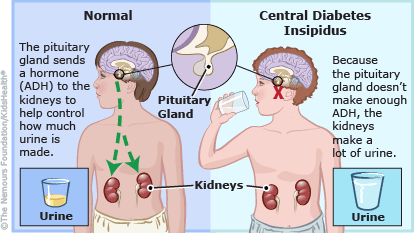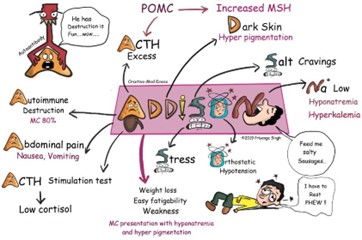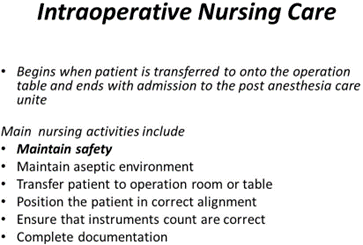The nurse is creating the care plan for a patient with symptoms of DI who was admited to the hospital for evaluation and treatment of the condition. An appropriate nursing diagnosis for the patient is:
Excess fluid volume related to intake greater than output.
Risk for impaired skin integrity related to generalized edema.
Activity intolerance related to muscle cramps and weakness.
Insomnia related to waking at night to void.
The Correct Answer is A
Excess fluid volume related to intake greater than output would be the most appropriate nursing diagnosis for a patient with symptoms of DI (diabetes insipidus). This condition results in excessive urine output and, as a consequence, can lead to dehydration and electrolyte imbalances. Therefore, monitoring and managing fluid volume is a priority for patients with DI.
Risk for impaired skin integrity related to generalized edema is more commonly associated with conditions that cause fluid retention such as heart failure, liver failure, or kidney disease, rather than DI.
Activity intolerance related to muscle cramps and weakness is a possible nursing diagnosis for patients with conditions that affect muscle function, such as muscular dystrophy or multiple sclerosis, but not specifically for DI.
Insomnia related to waking at night to void is more commonly associated with urinary frequency or nocturia due to conditions such as urinary tract infections or benign prostatic hyperplasia, but not specifically for DI.

Nursing Test Bank
Naxlex Comprehensive Predictor Exams
Related Questions
Correct Answer is D
Explanation
One of the hallmarks of adrenal insufficiency is dehydration and decreased urinary output, which can lead to electrolyte imbalances such as hyperkalemia and hyponatremia. As treatment begins to take effect, the patient's fluid and electrolyte balance should improve, leading to an increase in urinary output. Acute adrenal insufficiency, also known as the Addisonian crisis, is a life-threatening condition caused by a sudden decrease in cortisol and aldosterone hormones. Treatment usually involves the administration of intravenous glucocorticoids and mineralocorticoids to replace the deficient hormones.
Decreasing serum sodium (a) and decreasing blood glucose (b) are not signs of improvement but rather indicative of continued adrenal insufficiency. Decreasing serum potassium (c) is also not a sign of improvement as it could indicate that the patient is developing hyperkalemia, which is a potential complication of adrenal crisis.

Correct Answer is B
Explanation
Counting sponges, needles, and surgical instruments is an intraoperative activity that is specific to the circulating function of the perioperative nurse. The nurse is responsible for maintaining an accurate count of all surgical items to prevent leaving any foreign objects inside the patient after the surgery. This is a crucial task to ensure patient safety and prevent any potential complications that may arise from such errors.
Option a. admitting, identifying, and assessing the patient, is a preoperative function that is usually performed by the preoperative nurse.
Option c. passing instruments to the surgeon and assistants, is a scrub nurse function that requires knowledge of the surgical procedure and a sterile technique.
Option d. preparing the instrument table and sterile equipment is also a scrub nurse function that requires expertise in sterile technique, knowledge of surgical procedures, and the ability to maintain a sterile environment.

Whether you are a student looking to ace your exams or a practicing nurse seeking to enhance your expertise , our nursing education contents will empower you with the confidence and competence to make a difference in the lives of patients and become a respected leader in the healthcare field.
Visit Naxlex, invest in your future and unlock endless possibilities with our unparalleled nursing education contents today
Report Wrong Answer on the Current Question
Do you disagree with the answer? If yes, what is your expected answer? Explain.
Kindly be descriptive with the issue you are facing.
